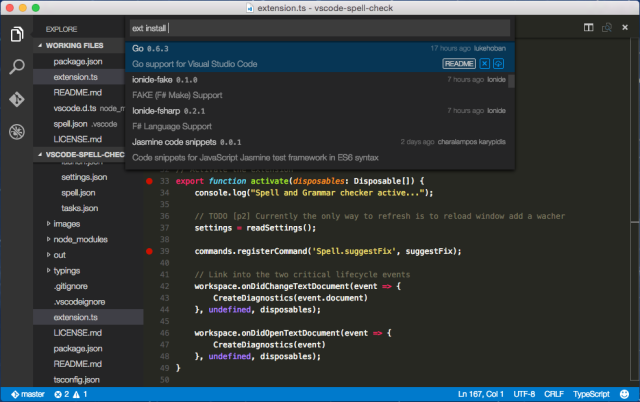
NEW YORK—Developers can now debug apps running on Linux servers or IoT devices from the comfort of Visual Studio. Microsoft today released a preview of a Visual Studio extension that adds remote debugging using GDB of Linux software.
This was one of many announcements made at Microsoft's Connect developer event today as the company aims to give its developer platform the broadest reach it's ever had, able to handle Android, iOS, and Linux development, alongside the more expected Azure, Office, and Windows. Visual Studio 2015 already made big strides in this direction, and Microsoft is pushing ahead to try to make Visual Studio the best development environment around.
The free and cross-platform Chromium-based code editor Visual Studio Code is being open sourced today. A new build has also been published, adding an extension mechanism to the editor. There are already some 60 extensions available, including new language support (such as Go language), richer debugging, code linters, and more.
Extensions for Visual Studio Code are found in a new place for distributing both free and paid extensions: Visual Studio Marketplace. This will replace the old Visual Studio Gallery and will be a single place for finding extensions for all versions of Visual Studio (Community, Professional, and Enterprise), Visual Studio Team Services (formerly known as Visual Studio Online), and Visual Studio Code.
In addition to extensions, Microsoft will also be using Marketplace to sell a new kind of Visual Studio subscription. Visual Studio Professional and Enterprise are both currently available through MSDN subscriptions bought on an annual basis. These subscriptions also provide development access to many other pieces of Microsoft software. The company is now offering Visual Studio Professional and Enterprise as cloud subscriptions, with options to pay month-by-month or annually. These subscriptions will include some of the things found in MSDN subscriptions, such as Azure credits and Pluralsight training, as well as access to Visual Studio Team Services.
Last year, Microsoft open sourced a big chunk of .NET and ported it to Linux and OS X. .NET Core 5 and ASP.NET 5 have now both reached Release Candidate status for both of those platforms and, of course, Windows. This comes with a "Go-Live License," meaning that they can be deployed and used in production environments and should cleanly upgrade to the final builds when available.
To make all-device development easier to access, Microsoft is releasing a new Visual Studio bundle called Dev Essentials, which includes Visual Studio Community Edition, the free tier of Visual Studio Team Services, and from early 2016, monthly Azure credits. It will include everything needed to develop for Windows, Android, and iOS.
Building for iOS does, however, still require access to a Mac; Visual Studio remotely controls the OS X toolchain to perform the actual building and application deployment. For those who don't want to manage Macs of their own, Microsoft has partnered with MacinCloud to provide access to OS X build agents for $30/month.
In addition to using the built-in support for Android and iOS development, Visual Studio is often used in conjunction with the Xamarin platform for cross-platform apps. Xamarin 4 was released yesterday, adding a new crash and performance analytics tool, Xamarin Insights, version 2 of its Xamarin.Forms library. It adds new iOS 9 and Android Marshmallow controls and a new build agent for performing software builds on OS X from within Visual Studio that should be easier to set up and more reliable than the current mechanism.
Xamarin 4 will be supported in Visual Studio 2015 when Update 1 is installed. Update 1 for both Visual Studio 2015 and Team Foundation Server 2015 is due to be released on November 30th. This contains a bunch of bug fixes and small feature updates, and it should also include updated SDK support for the Windows 10 November update.
As well as the GDB debugging extension, Azure Service Fabric—the management infrastructure for microservices on Azure that's used by Microsoft for Cortana, Lync, and Azure SQL—is now available in public preview. So too is access to the Microsoft Graph API that allows software to explore the connections between data within Office 365. Microsoft also announced that it will soon have a version of its Android emulator available for OS X.
Finally, Microsoft showed off a look at the next version of Visual Studio. A couple of features stand out: there's an optional new C++ compiler that uses the clang front-end with Microsoft's existing code generation and optimization back-end (known as C2); there is also a new system for extensions and plugins that allows users to opt in to a push model for updates rather than the current awkward pull model. This should make it easier to keep extensions and plugins up to date.
A version of the clang/C2 compiler is already used for Project Islandwood. Extending it to all Visual Studio C++ development is an exciting prospect for C++ developers; although Microsoft's own compiler has made great strides in recent years, clang offers superior standards support in a number of areas. Being able to take advantage of that in Visual Studio will be very welcome indeed.
reader comments
92